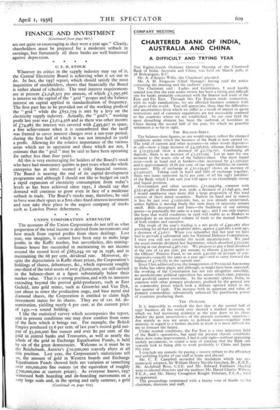COMPANY MEETING
CHARTERED BANK OF INDIA, AUSTRALIA AND CHINA
A DIFFICULT AND TRYING YEAR THE Eighty-fourth Ordinary General Meeting of the Chartered Bank of India, Australia and China, was held on March 30th, at 38 Bishopsgate, E.C.
Mr. A. d'Anyers Willis (the Chairman) presided.
Mr. A. H. Ferguson (Chief Manager) having read the notice convening the meeting and the auditors' report, The Chairman said : Ladies and Gentlemen, I need hardly remind you that the year under review has been a trying and difficult one for banks primarily concerned with the finance and trade of the East and Far East. Through this Far Eastern trade connection, with its wide ramifications, we are afforded business contacts with all parts of the world. You will appreciate, then, that the difficulties and uncertainties from which we suffer as a result of import or quota restrictions and of currency regulations are not necessarily confined to the countries where we are established. In our own field the most disturbing element has been the outbreak of hostilities in China during the second half of the year, for which no peaceful settlement is so far in sight.
THE BALANCE-SHEET.
The balance-sheet figures, as one would expect, reflect the changed conditions under which the business of the Bank is now carried on. The total of current and other accounts—in other words deposits— at call—show a large increase of £4,336,802, whereas fixed deposits at £15,553,198 show a decrease of £2,779,707. Combining all deposits, there is an increase of £1,557,095. Let us turn for one moment to the assets side of the balance-sheet. Our most liquid asset—cash in hand and at bankers—has increased by £1,550,932 and is approximately 18.68 per cent. of our sight liabilities on current accounts. Bills of exchange at £10,159,417 shows an increase of £1,920,027. Taking cash in hand and bills of exchange together, these two items represent 39.72 per cent. of all the sight liabilities of the Bank, which I am sure you will agree is an exceedingly strong and liquid position.
Government and other securities, £21,294,064, compare with £23,140,466 at December 31st, 1936, a decrease of £1,846,402, and I would emphasise once more that a large proportion of this total consists of short dated securities. Bullion on hand and in transit is less by just over £1,000,000, but, as you already understand, unless bullion is moving freely this item must of necessity remain small. Bills discounted and loans—the backbone of our earning power—is practically the same as a year ago ; and I can only express the hope that world conditions in 1938 will enable us as Bankers to participate in an increased volume of trade to the mutual benefits of both traders and ourselves.
The result of the year's trading is a net profit of £491,065 after providing for all bad and doubtful debts, against £496,682 a year ago, a decrease of £5,617. When you remember that last year we have had to provide a substantial sum for National Defence Contribution, I trust you will not consider the result unsatisfactory. We paid the usual interim dividend last September, which absorbed £210,000 leaving at our disposal £467,720. We propose to pay a final dividend at the rate of 14 per cent. per annum, to allocate £35,000 again to the Officers' Pension Fund, to set aside £40,000 on account of con- tingencies—exactly the same as a year ago—and to carry forward the balance of £178,785 to the current year.
Since I last addressed you, the inauguration of Provincial Autonomy in India has taken place, and although, as might have been expected, the working of the Constitution has not run altogether smoothly, no unwholesOme political opposition has arisen which time, patience and goodwill cannot overcome. In the economic sphere, India, in common with other primary producers, profited by the general rise in commodity prices which took a definite upward trend in the last quarter of 1936. The increase both in quantum and value of primary commodities substantially enhanced the purchasing power of countries producing them.
THE OUTLOOK.
It is impossible to overlook the fact that in the second half of 1937 business all the world over showed a marked recession, of which we had increasing evidence as the year drew to its close. Amidst the great uncertaintin of the present economic situation— due mainly as you are aware to political causes—together with anxieties in regard to a further decline in trade it is most difficult for me to forecast the future.
Under normal conditions, the Far East is a very important field of the Bank's operations, but until the present chaotic conditions there show some improvement, I feel it only right—without appearing unduly pessimistic, to sound a note of warning that the Bank can scarcely look to being able to work profitably in China and Japan this year. I conclude my remarks by paying a sincere tribute to the efficiency and unfailing loyalty of our staff at home and abroad.
Mr. C. F. Campbell seconded the resolution which was un- animously adopted, Sir William Henry Neville Goschen, Bt., K.B.E., Mr. Archibald Rose, C.I.E. and Mr. Edward Fairbairn Machay were re-elected directors and the auditors Mr. David Charles Wilscu, F.C.A., and Mr. Henry Croughton Knight Stileman, F.C.A., were re-appointed.
The proceedings terminated with a hearty vote of, thanks to the chairman, directors and staff.














































 Previous page
Previous page